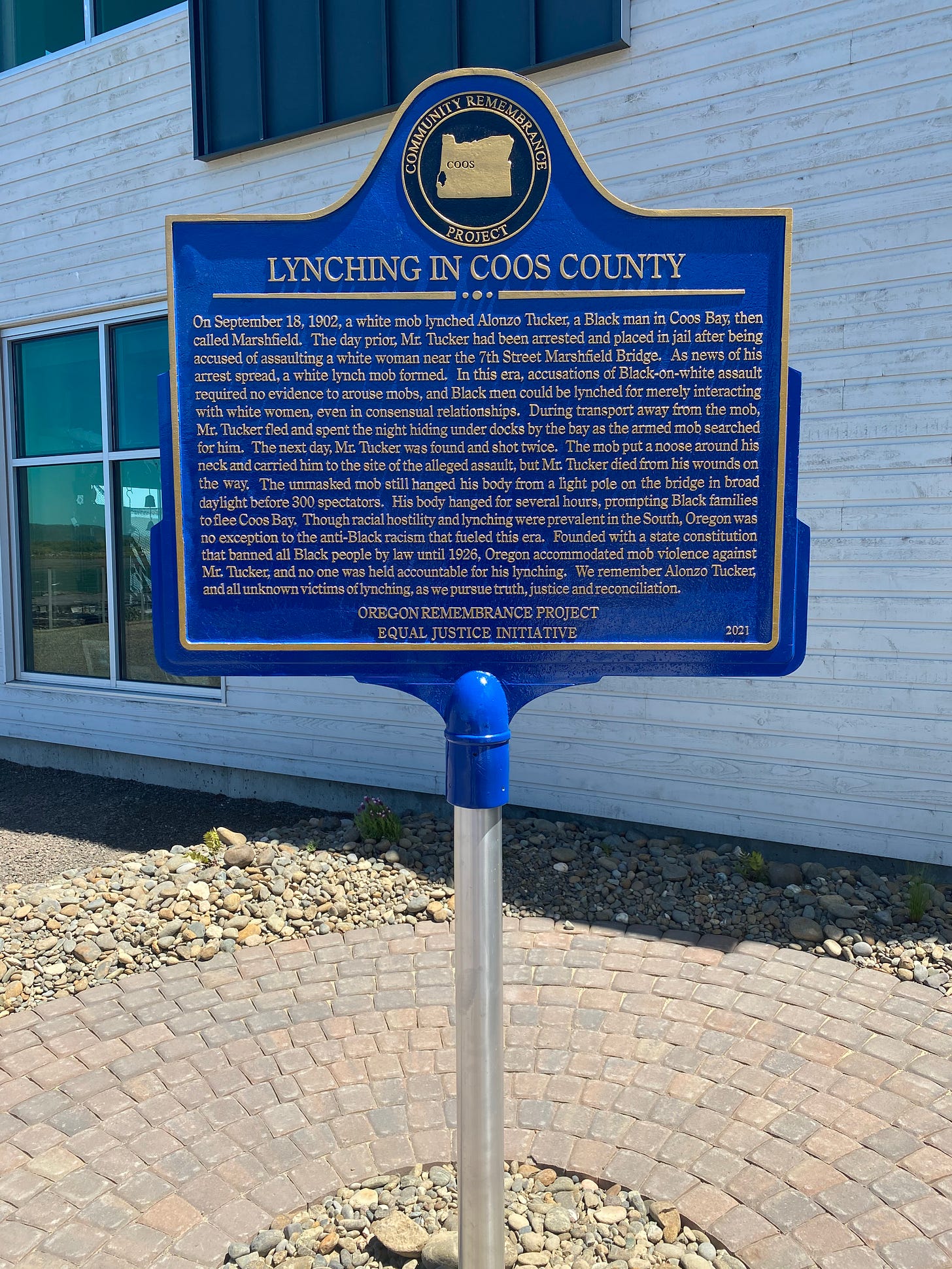You can (and should) end the death penalty in Oregon.
People ask me if I really think this connection between lynching and the death penalty will change hearts and minds. Well, let me tell you—I know it does. It changed my mind.
Editor’s note:
Many Oregonians support the death penalty. Are you one of them? If so, consider this an invitation to share your perspective on this issue. The Oregon Way aims to foster pragmatic, civil conversations — this is an important issue that cannot be resolved without hearing from all sides. Send me an email: kfraz@berkeley.edu
Founder of the Oregon Remembrance Project. Seeking the truth and repair required to bring us closer to reconciliation.
How do you reconcile a lynching?
It starts with remembrance, then it moves to repair.
June 19, 2021, we began the process of rewriting the ending to the story of Alonzo Tucker, Oregon’s only documented African American victim of lynching, by installing his story into the geographic memory of Oregon. This was the remembrance, now we must move to repairing the fundamental question of who our society believes deserves death because the answer continues to be disproportionately African American.
Lynching never ended, it just evolved. At the same time lynchings in the United States were going down, executions were going up. During the 1930s African Americans accounted for two-thirds of all executions in the United States. Between the years of 1910-1950, despite making up only 22% of the South’s population, executions of African Americans totaled to 75% of all those executed in the region.
This disproportionality continues to modern times. African Americans make up 13% of the population but 41% of those who are on death row. Consider the fact that of that 41%, nearly all are African American males; yet, African American males only make up 6.5% of our population. We have to ask ourselves, “How do we get from 6.5% to 41%?”
The color of your skin still plays a crucial role in whether our society believes you deserve death or not. Of the 172 individuals who have been exonerated from death row since the reinstatement of the death penalty—meaning individuals who were wrongfully arrested, wrongfully convicted, wrongfully put in prison, wrongfully put on death row—over half have been African American. We are still trying to kill innocent Black people, especially in areas with historical records of egregious treatment of Black individuals.
The states in the South, plus Texas and Oklahoma, had the highest number of lynchings, and, since the death penalty’s reinstatement, those states alone have accounted for 87% of all executions in the United States. The same region of the country that lynched is the same region of the country that executes. People always ask, “How did the North tolerate slavery? How did the North tolerate lynching? How did the North tolerate segregation?” The answer—the same way we tolerate the South right now.
We are too busy asking ourselves the question “Does this person deserve to die for their crimes?” that we haven’t asked ourselves the question “Do we deserve to kill?” Did you know Germany doesn’t have the death penalty? Germany knows that, given their history, it would be unconscionable for the country of Germany to systematically execute its citizens, especially if a disproportionate number of those citizens were Jewish. The world would be in outrage. We in the United States would be outraged if that were the case.
So where is that same outrage when, given our history, the United States systematically executes its citizens, and a disproportionate number of those citizens are African American? The Holocaust and slavery in the US are too distinct historical episodes, but they were both based on dehumanize. It follows that where one country (Germany) has taken meaningful steps to try to stop such behavior, the failure of the another (the United States) to stop a practice that dehumanizes and destroys life is glaring and troubling. Where is the outrage when, given Oregon’s history, a disproportionate number of African Americans sit on the state’s death row? Where is the outrage? Am I missing it? I don’t hear it.
We are burdened by our history of injustice. But, more importantly, we are burdened by our history of silence and inaction. However, we have the power to rewrite the ending to history’s stories.
So, I need your help to reconcile the lynching of Alonzo Tucker because I can’t do it by myself. I need your help to end the death penalty in Oregon. If you’ve ever wondered what you would have done had you been around during the lynching era, I can tell you the answer is “What are you doing about lynching right now?”
So, there are three things that you can do to put an end to lynching in Oregon. First, stay up to date on the work of the Oregon Remembrance Project. Second, study the death penalty conversation slides from the Oregon Remembrance Project’s website and share them with others. Third, and most importantly, tell someone about lynching and the death penalty. A statewide initiative can end the death penalty in Oregon. That means we the people can end the death penalty in Oregon one conversation at a time. I am imploring you to start these conversations.
People ask me if I really think this connection between lynching and the death penalty will change hearts and minds. Well, let me tell you—I know it does. It changed my mind.




